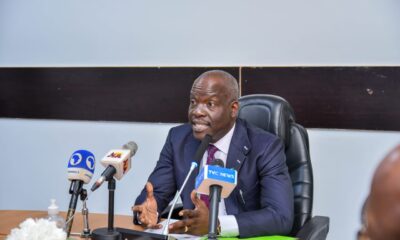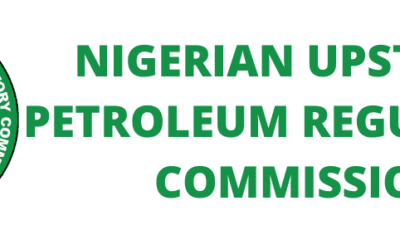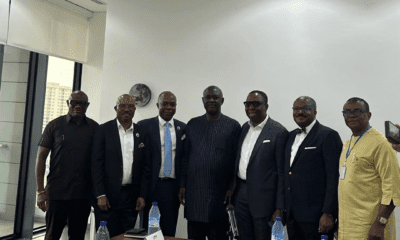Oil & Gas
NUPRC gazettes 5 oil industry regulations, completes 6 others
The Nigerian Upstream Petroleum Regulatory Commission (NUPRC) says five petroleum industry regulations have been gazetted while six others have been finalised and ready for gazetting.
Mr Gbenga Komolafe, Commission Chief Executive, NUPRC, disclosed this on Monday in Abuja at the third Phase of its Consultation with Stakeholders on Draft Regulations Development as mandated by Section 216 of the Petroleum Industry Act (PIA).
Komolafe listed the regulations gazetted as, the Nigeria Upstream Petroleum Host Community Development Trust regulations; Royalty Regulations; Domestic Gas Delivery Obligation Regulations; Nigeria Conversion and Renewal {Licence and Lease} Regulations and Petroleum Licensing Round Regulations.
The CCE, represented by an Executive Commissioner, NUPRC Mr Habib Nuhu, recalled that thirteen draft regulations were presented for discussion during its first and second phase of consultations with stakeholders in 2022.
He said the inputs of the stakeholders from the engagement were incorporated, where necessary, in the draft regulations.
“Thereafter, the regulations were forwarded to the Honourable Attorney General of the Federation and Minister of Justice for vetting, legislative standardisation, and approval.
“I am happy to inform you that five of the regulations have been gazetted while the remaining six have been finalised and ready for gazetting,” he said.
In furtherance of the above and in compliance with Section 216(4)(g) of the PIA 2021, he said the commission organised yet another Stakeholder Consultation prior to finalising more draft regulations.
He listed them as the Upstream Petroleum Measurement Regulations; Advance Cargo Declaration Regulations; Significant Discovery Regulations; Gas Flaring, Venting and Methane Emissions (Prevention of waste and Pollutions) Regulations and Domestic Crude Oil Supply Obligation Regulations.
The CCE reiterated that the process of formulating the above regulations has been a rigorous and strenuous exercise.
“They are products of critical thinking and evaluation, and hard work by the Commission’s Regulation development Team and the Presidential Implementation Committee on PIA.
“In spite of this however, the process is not complete until the stakeholders’ critical inputs are obtained, discussed, and incorporated, where necessary, in the Regulations,” he added.
He called for a healthy, robust, and intellectual discussion on the regulations during the syndicate sessions to come out with robust regulations with best international best standard.
He said it would ensure that regulations and key policies necessitated by the PIA were developed and gazetted timely so that the industry operators could align their operations with the PIA provisions as quickly as possible.
Mr Kelechi Ofoegbu, Executive Commissioner, Economic Regulation and Strategy Planning, NUPRC, while providing insight into the regulations explained that the measurement regulations would give the regulator the capability of knowing exactly what was produced by different upstream oil operators.
He said, it became necessary to understand the regulation because through the years of production in Nigeria, there has been the quest to know how much we produce and how much we consume, from upstream to midstream to downstream.
“If you ask 10 people in the industry what are your production and consumption numbers, you will get 10 different responses. So nobody takes us seriously, whether is on gas flaring, or whatever. I think that is enough already,” he said.
The engagement had in attendance the Oil Producers Trade Section, Independent Petroleum Producers Association, IOCs, Indigenous Operators among others.
Oil & Gas
OPEC daily basket price stood at $93.12 a barrel Monday
THE price of OPEC basket of 13 crudes stood at $93.12 a barrel on Monday, September 11, 2023, compared with $92.84 last Friday, according to OPEC Secretariat calculations.
The OPEC Reference Basket of Crudes, ORB, is made up of the following: Saharan Blend (Algeria), Girassol (Angola), Djeno (Congo), Zafiro (Equatorial Guinea), Rabi Light (Gabon), Iran Heavy (Islamic Republic of Iran), Basrah Medium (Iraq), Kuwait Export (Kuwait), Es Sider (Libya), Bonny Light (Nigeria), Arab Light (Saudi Arabia), Murban (UAE) and Merey (Venezuela).
News
Independent petroleum producers, others set agenda for incoming administration
The Independent Petroleum Producers Group (IPPG) has called on the incoming administration of Sen. Bola Tinubu to address the bottlenecks mitigating against industry growth and energy security.
The IPPG Chairman, Mr Abdulrazaq Isa, made the call on Monday in Abuja at the sixth edition of the Nigeria International Energy Summit (NIES).
Isa said the administration’s agenda for the industry should be geared toward improving investor confidence through the effective implementation of the Petroleum Industry Act (PIA) and strengthening regulatory institutions.
He said the incoming administration should arrest the menace of crude theft across the Niger Delta which still lingered in spite of the recent successes recorded by the Federal Government.
Isa listed others as harnessing the nation’s hydrocarbon asset, particularly gas, to catalyse and rapidly industrialise the economy, building a broader value-creating midstream (gas processing plants) and downstream (refineries) and transforming Nigeria into a product supplier.
He emphasised the need to eliminate industry-wide subsidies for all hydrocarbon and refined products as they remain detrimental to the growth of a vibrant industry.
Isa also called for an immediate repositioning of the industry.
“The Nigerian oil and gas industry has a very limited window to get things right and must work toward the rapid exploitation of its vast hydrocarbon assets for the socio-economic transformation and deploying same to guarantee our energy security.
“It is instructive to note that this edition of the NIES will be the last of this current administration.
“It is on that note and on behalf of the Board of Trustees and the Governing Council of the IPPG I commend President Muhammadu Buhari, for his unwavering commitment to the survival and growth of our industry.
“Under his leadership, his administration has delivered unprecedented milestones across the entire industry, notably, the enactment PIA in 2021 which has boosted investor confidence after a two-decade lull in activities.
“This landmark legislation has begun the transformation of Nigeria’s oil and gas industry and laid a solid foundation for the growth and development of the industry for future generations,’’ he said.
Also speaking, Dr Omar Farouk, the Secretary-General, African Petroleum Producers’ Organisation (APPO), called for enabling environment for African energy security.
Farouk listed challenges in the African energy industry as lack of funding, technology and reliance on foreign markets.
He said for seven decades that Africa had been producing petroleum; it had relied essentially on external finance and always depended on foreign technology and to some extent expertise to produce the products.
Farouk said that these three challenges had been the focus of APPO in the last three years and it had concluded that the future of the industry lied on the hands of Africans.
“For the funding of the oil and gas projects across the continent, we have gone into partnership with the African Export-Import Bank to establish Africa Energy Bank with objective of financing oil and gas projects in the continent.
“For technology and expertise, the APPO secretariat has just concluded a tour of institutions of oil and gas training in some of our member countries for centres of excellence in petroleum industry.
“We want to banish the mindset that our people are too poor to buy energy and empower people to have access to energy,’’ he said.
The event also featured remarks by the Secretary-General of Gas Exporting Countries Forum, Mohamed Hamel, and Chairman, Oil Producing Trade Section, Mr Rick Kennedy, among others.
News Men reports that the summit, scheduled to hold from April 16 to April 20, has its theme as “Global Perspectives for a Sustainable Energy Future“
News
Global energy demand to increase by 23% to 2045 – OPEC
THE Organisation of Petroleum Exporting Countries (OPEC) says global primary energy demand is forecast to increase by 23 per cent in the period to 2045, which necessitates utilising all forms of energy.
The OPEC said based on its World Oil Outlook (WOO) forecast, resultantly, many of its Member Countries had invested heavily in renewables, which had received a positive endorsement from the G20 developing nations.
OPEC Secretary-General Haitham Al Ghais, made this known in Abuja on Monday at the sixth edition of the Nigeria International Energy Summit (NIES 20223) with the theme: “Global Perspectives for a Sustainable Energy Future,”.
The summit, scheduled to hold from April 16 to April 20, was declared open at the Presidential Banquet Hall by President Muhammadu Buhari through the Secretary to the Government of the Federation, Mr Boss Mustapha.
Al Ghais listed the renewables as solar, nuclear, wind and waste-to-energy power, in addition to Carbon Capture Utilisation and Storage (CCUS) and hydrogen projects, as well as the Circular Carbon Economy.
“At OPEC, we recognise that the scope of the climate challenge requires comprehensive solutions. There is no panacea that can solve it alone.
“The oil and gas industry can foster its resources and expertise and help unlock our emissions-free future, through its role as a powerful innovator in developing cleaner and more efficient technological solutions.
“A diverse range of mitigation measures are necessary.
“The capacities and national circumstances of developing countries must be taken into account in all actions. We should never forget that climate change and sustainable development are two sides of the same coin,’’ he said.
He said that OPEC, as an intergovernmental organisation, composed exclusively of developing countries, seven of which are African, would want all voices included in discussions on energy transitions.
He said it had been directly involved in the evolution of the United Nations Framework Convention on Climate Change (UNFCCC), from the UN Intergovernmental Negotiating Committee in 1990, to COP27 in Sharm El-Sheikh in 2022.
“We are delighted that COP28 will be hosted by our Member Country, the United Arab Emirates.
“In addition to being involved in climate negotiations, OPEC and its Member Countries are proactive in looking for a diverse range of energy sources to meet the needs of the future,’’ he said.
The Secretary-General further said that the global oil sector alone would need cumulative investment of 12.1 trillion dollars through to 2045.
However, he said in recent years, it had heard calls from some to limit or stop funding for new oil and gas projects which was disheartening, and particularly impactful on developing countries with oil and gas resources.
“This great continent, Africa, has 120 billion barrels of proven oil reserves and 18 trillion standard cubic metres of natural gas.
“For countries to properly utilise these resources for the benefit of their people, investment levels must be adequate, whilst taking actions to reduce the carbon footprint of the oil industry.
“However, movements by financial institutions to limit and stringently control how money is invested into fossil fuels under environmental, social and governance (ESG) constraints impedes the realisation of this potential.
Al Ghais, while commending President Muhammadu Buhari for being a strong supporter of OPEC, also looked forward to a continued cooperation with the incoming administration led by President Elect, Sen. Bola Tinubu
-
capital market2 years ago
Rt.briscoe, FBNH, Others halts negative performance of stock market
-
Finance3 months ago
Court orders Sen. Victor Umeh to repay N136m bank debt to AMCON
-



 Abuja Update2 months ago
Abuja Update2 months agoUNDP, FG partnership needed to achieve inclusion, equity- Minister
-
Abuja Update1 month ago
Banks drive stock market performance with N147bn gain
-



 Business1 week ago
Business1 week agoTingo Group unveils Tingo Electric, Tingo Cola drink at Lagos launch
-



 Health2 weeks ago
Health2 weeks agoCapacity training will reduce migration of health workers- NPHCDA
-
News4 months ago
Oil thieves sponsoring malicious media campaign against Navy – Spokesman
-



 Infotech1 month ago
Infotech1 month agoWorld Backup Day: NITDA urges Nigerians to ensure backup of data












